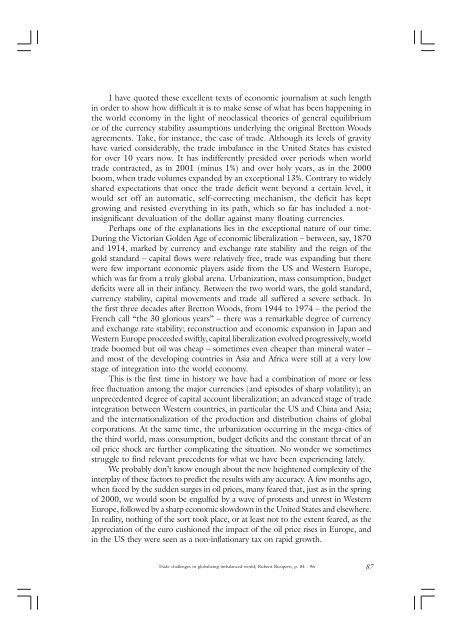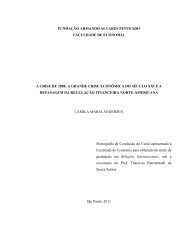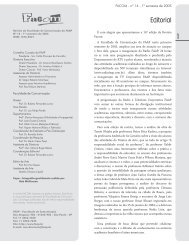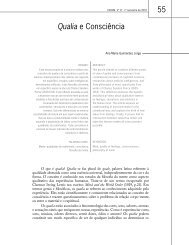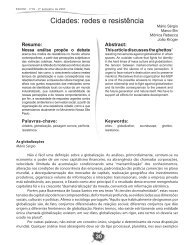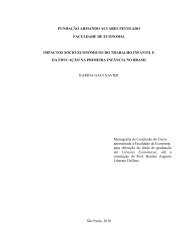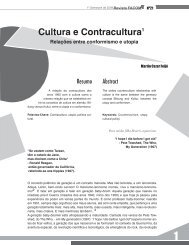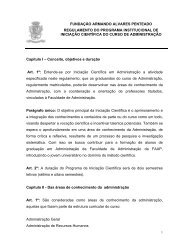Número 8 - Janeiro 2006 - Faap
Número 8 - Janeiro 2006 - Faap
Número 8 - Janeiro 2006 - Faap
You also want an ePaper? Increase the reach of your titles
YUMPU automatically turns print PDFs into web optimized ePapers that Google loves.
I have quoted these excellent texts of economic journalism at such length<br />
in order to show how difficult it is to make sense of what has been happening in<br />
the world economy in the light of neoclassical theories of general equilibrium<br />
or of the currency stability assumptions underlying the original Bretton Woods<br />
agreements. Take, for instance, the case of trade. Although its levels of gravity<br />
have varied considerably, the trade imbalance in the United States has existed<br />
for over 10 years now. It has indifferently presided over periods when world<br />
trade contracted, as in 2001 (minus 1%) and over holy years, as in the 2000<br />
boom, when trade volumes expanded by an exceptional 13%. Contrary to widely<br />
shared expectations that once the trade deficit went beyond a certain level, it<br />
would set off an automatic, self-correcting mechanism, the deficit has kept<br />
growing and resisted everything in its path, which so far has included a notinsignificant<br />
devaluation of the dollar against many floating currencies.<br />
Perhaps one of the explanations lies in the exceptional nature of our time.<br />
During the Victorian Golden Age of economic liberalization – between, say, 1870<br />
and 1914, marked by currency and exchange rate stability and the reign of the<br />
gold standard – capital flows were relatively free, trade was expanding but there<br />
were few important economic players aside from the US and Western Europe,<br />
which was far from a truly global arena. Urbanization, mass consumption, budget<br />
deficits were all in their infancy. Between the two world wars, the gold standard,<br />
currency stability, capital movements and trade all suffered a severe setback. In<br />
the first three decades after Bretton Woods, from 1944 to 1974 – the period the<br />
French call “the 30 glorious years” – there was a remarkable degree of currency<br />
and exchange rate stability; reconstruction and economic expansion in Japan and<br />
Western Europe proceeded swiftly, capital liberalization evolved progressively, world<br />
trade boomed but oil was cheap – sometimes even cheaper than mineral water –<br />
and most of the developing countries in Asia and Africa were still at a very low<br />
stage of integration into the world economy.<br />
This is the first time in history we have had a combination of more or less<br />
free fluctuation among the major currencies (and episodes of sharp volatility); an<br />
unprecedented degree of capital account liberalization; an advanced stage of trade<br />
integration between Western countries, in particular the US and China and Asia;<br />
and the internationalization of the production and distribution chains of global<br />
corporations. At the same time, the urbanization occurring in the mega-cities of<br />
the third world, mass consumption, budget deficits and the constant threat of an<br />
oil price shock are further complicating the situation. No wonder we sometimes<br />
struggle to find relevant precedents for what we have been experiencing lately.<br />
We probably don’t know enough about the new heightened complexity of the<br />
interplay of these factors to predict the results with any accuracy. A few months ago,<br />
when faced by the sudden surges in oil prices, many feared that, just as in the spring<br />
of 2000, we would soon be engulfed by a wave of protests and unrest in Western<br />
Europe, followed by a sharp economic slowdown in the United States and elsewhere.<br />
In reality, nothing of the sort took place, or at least not to the extent feared, as the<br />
appreciation of the euro cushioned the impact of the oil price rises in Europe, and<br />
in the US they were seen as a non-inflationary tax on rapid growth.<br />
Trade challenges in globalizing imbalanced world, Rubens Ricupero, p. 84 - 96<br />
87


